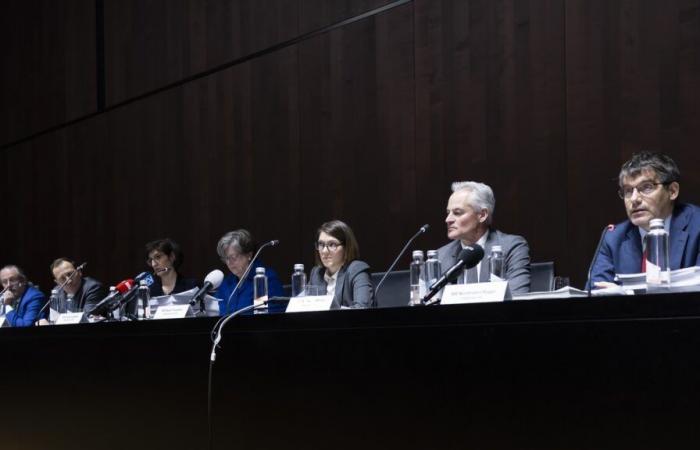The Parliamentary Commission of Inquiry (CEP) delivered its verdict on the Credit Suisse case this Friday in Bern.Keystone
The fall of Credit Suisse in March 2023 is the result of many years of mismanagement, according to the conclusions of the Parliamentary Inquiry Commission (CEP) revealed on Friday. If the federal authorities have not committed a direct fault, they have accumulated failings at several levels, which highlights significant flaws in the management of the crisis.
20.12.2024, 13:0920.12.2024, 13:12
“After years of mismanagement, all it took was one trigger to destabilize Credit Suisse,” said Matthias Michel, senator (PLR/ZG).
According to the CEP, the main responsibility lies with the bank’s board of directors and management, which repeatedly ignored warnings from Finma, the Swiss financial market supervisory authority. Isabelle Chassot (Center/FR), president of the commission, recalled that these warnings did not lead to significant changes.
Delays and hesitations of the Federal Council
The report also criticizes the Federal Council and Parliament for their too slow management of the regulatory adaptations necessary after 2015. Thomas Matter (UDC/ZH) pointed out a relaxation in the implementation of the essential tools to prevent crises, particularly in the framework of the “too big to fail” regulation. The creation of a liquidity guarantee mechanism, requested in 2018 by Finma and the Swiss National Bank (SNB), was only initiated in 2022, forcing the authorities to act urgently when the crisis broke out.
Despite increased surveillance from 2022, Finma was unable to prevent the debacle. The commission criticizes the fact that no sanctions have been taken against the bank despite the successive scandals. Worse, regulatory relief allowed Credit Suisse to mask its financial weaknesses from 2021.
“The regulatory filter granted hid the real financial situation of the bank”
Thomas Matter (UDC/ZH)
Effective but constrained crisis management
Coordination between the different authorities also left something to be desired. The Federal Council only received fragmentary and often late information, which slowed down its responsiveness. MP Roger Nordmann (PS/VD) pointed out that the former head of the Federal Department of Finance, Ueli Maurer, had delayed alerting the government for fear of leaks, thus limiting the ability to anticipate.
The CEP, however, welcomes the work carried out during the critical phase of March 2023. The authorities, meeting in a crisis unit, managed to avoid a global financial crisis by maintaining the solvency of Credit Suisse until its takeover by UBS. This solution, although imperfect, made it possible to preserve the stability of the financial system. However, the CEP warns that lessons must be learned from this episode to prevent such a situation from happening again. (mbr with ats)
More articles on the Credit Suisse debacle
The conclusion of negotiations between Switzerland and the European Union (EU) is expected this Friday in Bern. The Federal Council should look into the matter during its meeting. To mark the occasion and conclude the discussions, the President of the European Commission, Ursula von der Leyen.
The Federal Council held an initial discussion on the European issue during its meeting last week. According to various media, the government should decide on the conclusion of the negotiations during its session on Friday. However, this information could not be confirmed because the Federal Council remains in control of the agenda until the last moment.






